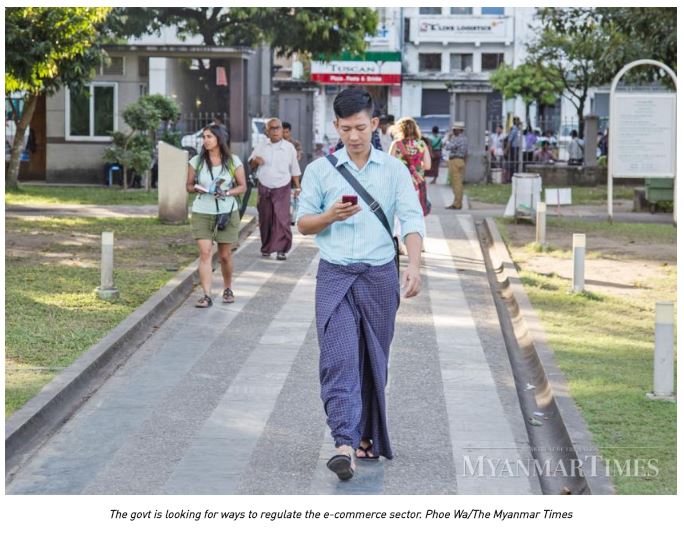Myanmar: E-commerce sector under govt scrutiny for tax purposes
Government departments are rushing to manage and regulate e-commerce for tax purposes, according to the Ministry of Commerce (MOC) and Internal Revenue Department (IRD).
Currently, e-commerce businesses mostly use Facebook to promote or trade products. Meanwhile, other online platforms created specifically for online shopping are growing quickly in the local market, according to the Myanmar Retailers Association.
Few of these businesses are registered as tax payers. This has riled registered brick-and-mortar operations which pay taxes every year, according to the MOC and many individual businessmen.
Registered businesses already face competition from imported as well as illegal goods and services in the market. “On top of that, we have to pay tax. Now we are facing competition from online platforms selling goods in the market. As these businesses don’t pay tax, they can sell their goods for cheaper prices,” said U Kyaw Kyaw Win, central executive committee of the Union of Myanmar Federation of Chambers of Commerce and Industry (UMFCCI).
“Many e-commerce businesses don’t want to register and pay tax. Registered businesses are paying tax. We need fair competition and a level playing to do business,” said U Aye Thaung, chair of Shwe Lin Pan Industrial Zone management committee.
U Min Lwin Oo, deputy director of the IRD, said the authorities are discussing ways to manage and regulate the expanding e-commerce industry. “We are studying how our neighbouring markets are managing and taxing e-commerce businesses and seeking advice from the World Bank and IMF,” he said.
Meanwhile, the MOC is working with other government departments to draft an e-commerce law for the country. It is also consulting with the Myanmar Retailers Association and will form a working group with the private sector to resolve the issue.
The need for such legislation is rising in Myanmar as consumers have little recourse against scammers or protection against sellers who deliver faulty or fake products. “We are now talking to the MOC about setting relevant regulations to protect online consumers,” said U Myo Min Aung, vice chair of Myanmar Retailers Association.
“There is currently no existing legislation for e-commerce. As there are no regulations, we cannot take action against e-commerce offenders or scammers. This is still a gray area for the government so it is difficult to protect consumers,” said U Min Min, deputy director general of the trade department under the MOC.
“Our priority will be to identify and regulate the e-commerce sector and then find sustainable ways to tax these businesses,” he said.
Source: https://www.mmtimes.com/news/e-commerce-sector-under-govt-scrutiny-tax-purposes.html


 Thailand
Thailand




